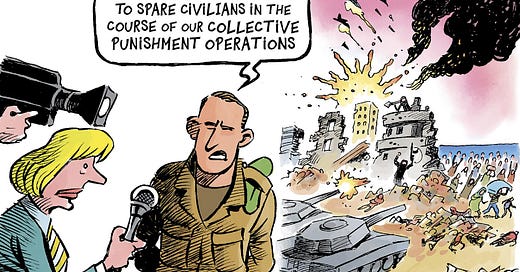Welcome back to Political Misfits, where we bring you news, politics and culture - without the red and blue treatment. I am John Kiriakou here with Michelle Witte.
Today is October 7, which means it’s the one-year anniversary of a Hamas military action against a concert in southern Israel that has set off one of the bloodiest regional wars in modern times. Nobody could have predicted that a year later Israel would be at war with Hamas, Hezbollah, the Houthi militia, and for all intents and purposes, Iran. There have been multiple attempts by the governments of the United States, Qatar, Egypt, and others to negotiate a ceasefire and hostage release, but to no avail. Israel has made it clear that it wants to destroy Hamas, destroy Hezbollah, and destroy Iran, although there is no apparent plan for the day after, let alone a definition of the word “destroy.” But one year later, tens of thousands of Palestinian civilians are dead, hundreds–and perhaps thousands–of Lebanese are dead, and Israel and Iran are on the brink of actual war. The region is facing its greatest upheaval in more than half a century. And the situation is likely to only get worse. // Meanwhile, the conflict in Ukraine continues. Ukrainian forces hit a major oil depot in Crimea while Russian forces consolidated their gains farther north. Russia-watchers in the US are saying that the recent Russian gains are too much for the Ukrainians to handle and that there is a likelihood that the war could begin to wind down as winter sets in. One academic who recently returned from the region said that he believed peace talks would be forthcoming in the next four or five months and that an eventual settlement would be along the lines of what Moscow first proposed almost two years ago. // In Washington, Russian Ambassador Anatoly Antonov quietly returned to Moscow earlier this month at the end of his assignment. He said in an email to his American contacts that he will likely not be replaced in the near term.
We’re joined by foreign affairs and security analyst Mark Sleboda.
https://www.nytimes.com/live/2024/10/07/world/israel-iran-hezbollah-lebanon
How Gaza Became a Mass Death Trap - The New York Times
A year on from October 7, the Middle East is facing its greatest upheaval in a half-century | CNN
Ukraine strikes oil depot in occupied Crimea
Russia's envoy to US ends his term at time of bilateral turmoil | Reuters
Questions:
Thanks for joining us, Mark. Let’s start with the Middle East, where there doesn’t appear to be any good news at all. Gaza is essentially destroyed, but the fighting continues there. Israel announced over the weekend that it would call up additional troops to send to Lebanon. Militarily, how long can the Israelis keep up this level of fighting? When will it begin to degrade their capabilities?
The United Nations said over the weekend that famine and disease are spreading in Gaza unlike anything that has been seen there previously. But nobody seems to be doing anything about it except a handful of NGOs. What’s the endgame here? Are we going to see deaths by starvation, disease, and neglect that rival death by violence? And what about southern Lebanon?
There is a real fear that this conflict will continue to spread, with a hotter war between Israel and Iran on the horizon. It’s also possible that the Syrians and Iraqis could jump in as well as, frankly, the United States. How bad do you see this getting, especially in light of the fact that the Israelis are not at all interested in peace talks and the Americans are perfectly happy to back them?
Mark, I had dinner with a group of Russia scholars over the weekend, and they are of the belief that the war will end in the next four-to-six months with, essentially, a Russian victory. That victory will be that Russia will maintain what it holds in the Donbas and in Crimea. They also hold that Ukraine simply cannot keep up its fight with Russia and that President Zelensky is unpopular and will likely not remain in Ukraine until the end of 2025. Do you agree with this assessment? And if so, what would negotiations look like?
Russian Ambassador Anatoly Antonov quietly left Washington on October 4. He sent an email to all of his American contacts to say goodbye and to opine that nobody should expect to see an improvement in Russian-US relations in the foreseeable future. He also said that he is not likely to be replaced in that same period. What does this mean for US-Russian relations? It seems that the only bright light was the fact that Russia had a capable and politically well-connected ambassador here who could get into the White House when he needed to. Now that’s over. What are your thoughts?













Share this post